Key research themes
1. How can virtual simulation improve specialized professional training and ergonomics?
This research area investigates the use of virtual simulation to enhance professional training outcomes and ergonomics in specialized domains, such as emergency medical services, nursing education, crane operation, and urban combat training. It matters because traditional training can be costly, risky, or limited by physical constraints, whereas virtual simulators offer immersive, safe, repeatable, and customizable environments that can improve skill acquisition, safety, and operational efficiency.
2. What frameworks, modeling languages, and architectures support the development of complex and reusable virtual simulators?
This theme addresses the software engineering and system architecture aspects underpinning the creation of virtual simulators and VR/AR environments. It includes the use of formal modeling languages for precise simulation definition, frameworks enabling modular and extendible simulator development, and systematic approaches to integration of components and multimodal inputs. Advancing this infrastructure is crucial for scalable, maintainable, and interoperable virtual simulation platforms supporting diverse applications.
3. How is virtual reality simulation evolving as a cultural and market phenomenon and in educational contexts?
This theme encompasses research analyzing virtual reality simulation trends in entertainment markets, educational environments, and societal impacts. It examines how VR is incorporated into learning frameworks, the growth of VR applications on digital marketplaces, and the cultural construction of virtual worlds, addressing user engagement, accessibility, and digital transformation in education and leisure industries.












